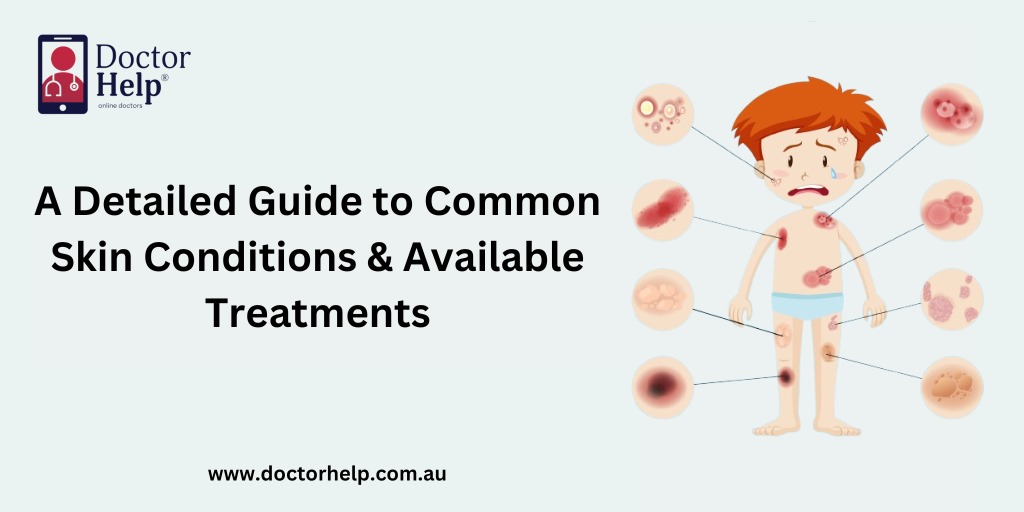“Healthy skin is a reflection of overall wellness” Dukes Avenue
Table of Contents
Overview
Skin illnesses are ailments affecting the skin. Rashes, inflammation, itching, and other skin abnormalities can also be caused by these illnesses. Certain skin disorders may be inherited, whereas lifestyle choices may bring others on. Treatment options for skin conditions include prescription drugs, ointments or lotions, and lifestyle modifications.
Most Common Skin Conditions
Skin conditions vary in severity, with some being minor and others causing significant symptoms. Common skin disorders include the following:
Acne: clogged hair follicles resulting in a buildup of oil, bacteria, and dead skin cells within pores.
Rosacea: Facial skin that appears flushed and thickened, often accompanied by pimples.
Alopecia areata: Hair loss in small, localized areas.
Atopic dermatitis (eczema): skin that is dry and itchy, potentially leading to inflammation, cracking, or a scaly appearance.
Raynaud’s phenomenon: intermittent reduction in blood flow to extremities, causing numbness or changes in skin color.
Psoriasis: skin with a scaly texture that may become inflamed or warm.
Skin cancer: Unregulated growth of abnormal cells in the skin.
Vitiligo: loss of skin pigmentation in specific areas, resulting in patchy discoloration
Symptoms
The symptoms of skin diseases may differ greatly depending on the illness. Skin illnesses are usually not the cause of skin changes. For example, wearing shoes that do not fit well can cause blisters. In contrast, skin changes that appear for no apparent reason could be a sign of an underlying illness.
Common indicators of skin conditions include the following:
- Reddish or whitish elevated spots.
- Itchy or painful eruptions.
- Skin with a rough or scaly texture.
- Skin shed.
- Sores.
- Skin areas with abnormal coloration.
- Exposed wounds or skin lesions.
- Dry and cracked skin.
- Skin outgrowths such as warts or fleshy lumps.
- Changes in the size or color of the moles.
- Frequent or intense blushing.
- Skin that has lost pigmentation.
Causes
Various lifestyle choices contribute to the onset of skin disorders. In addition, existing health issues may affect the condition of the skin. Some common triggers for skin diseases include the following:
- Bacterial accumulation within the pores or hair follicles.
- Disorders affecting the thyroid, kidney, and immune systems.
- Presence of fungi or parasites on the skin surface.
- Certain medications are used to treat inflammatory bowel disease (IBD).
- Viral infections.
- Diabetes.
- Solar radiation.
Treatment
A wide range of skin conditions can be effectively managed. Various treatment options for dermatological issues include the following.
- Antihistamines.
- Topical medications (creams and ointments).
- Antibiotics.
- Corticosteroid injections.
- Laser treatments.
- Specific prescription drugs.
- Biologics.
Additionally, lifestyle modifications can alleviate the symptoms of skin disorders.
- Follow your healthcare provider’s advice on restricting certain foods such as sugar or dairy products.
- Implementation of stress management techniques.
- Maintaining proper hygiene including appropriate skincare routines.
- Minimizing alcohol consumption and avoiding smoking.
How can I prevent skin diseases?
Certain skin conditions, such as those caused by genetic factors or autoimmune disorders, are unavoidable. However, measures should be taken to prevent or mitigate the effects of contagious or infectious skin ailments. To reduce the risk of contracting or experiencing symptoms of communicable skin diseases, we considered the following strategies:
Maintain skin hydration: Apply a high-quality moisturizer to prevent the skin from becoming dry and cracked, which can increase susceptibility to infections.
Wear protective clothing: Shield your skin with gloves, headwear, and long-sleeved shirts when encountering harsh environmental conditions, chemicals, or allergens.
Practice proper wound care: Thoroughly clean and cover any cuts, abrasions, or injuries to ward off infections.
Minimize prolonged water contact: Reduce the time spent in water, particularly chlorinated pools, to prevent skin irritation and dryness.
Use mild soaps and detergents: Choose mild soaps and detergents because harsh cleaning agents can strip away natural skin oils, increasing the likelihood of irritation.
Refrain from facial contact: Minimize touching your face to reduce the transfer of bacteria, viruses, and dirt from your hands to your skin.
Maintain nail hygiene: Nails should be kept short and clean, as long or dirty nails can harbor microorganisms that may lead to skin infections.
Avoid excessive sweating: Shower promptly after activities that induce heavy sweating to prevent bacterial or fungal growth.
Stay up to date with vaccinations: Certain vaccines, such as the HPV vaccine, can help prevent skin-related issues such as warts.
Role of Telehealth in Skin Care
Technological developments have opened the door to creative ways to improve the accessibility and convenience of medical services in the rapidly evolving field of healthcare. The emergence of telemedicine dermatology is one such development that revolutionizes the treatment of skin issues.
Telehealth dermatology: The practice of providing dermatological services remotely via telecommunication technology is known as telehealth dermatology. As a convenient substitute for conventional in-person visits, patients can schedule virtual video consultations with telehealth dermatologists for online dermatological consultation.
Advantages of telehealth dermatology
- Convenient and accessible.
- Faster care – Telehealth can reduce wait times to see our providers.
- Enhances the ability to manage chronic conditions.
- Continuity of care.
Telehealth is an excellent way to visit us! DoctorHelp live video appointments enable communication with our providers to address both new and persistent dermatological issues. Our experts can assess and treat the majority of common skin diseases during a telemedicine appointment. Our providers will recommend an in-person visit if they think that you require more therapy.
Conclusion
Any disorder that irritates, clogs, or damages the skin is considered a skin illness, similar to skin cancer. You might acquire or inherit a skin illness. Rashes, dry skin, and itching are the symptoms of several skin conditions. Medication, good skincare, and lifestyle modifications can help manage these symptoms. As the healthcare industry continues to change owing to technology, teledermatology is becoming a useful tool for treating common skin conditions. Telehealth skin care, which embraces the digital era, is a revolutionary method of dermatological treatment rather than merely a fad.








